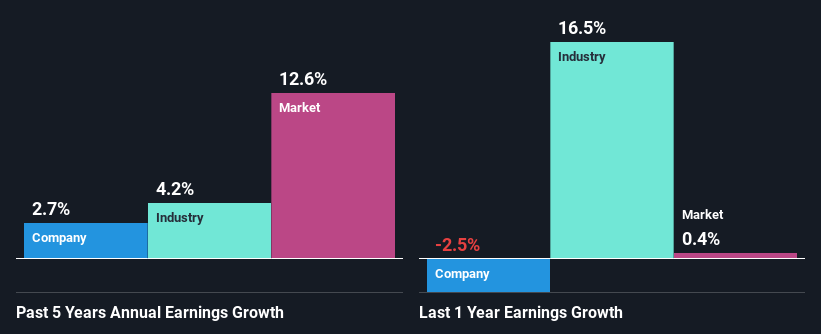Has Beiersdorf Aktiengesellschaft's (ETR:BEI) Impressive Stock Performance Got Anything to Do With Its Fundamentals?
Most readers would already be aware that Beiersdorf's (ETR:BEI) stock increased significantly by 9.8% over the past month. We wonder if and what role the company's financials play in that price change as a company's long-term fundamentals usually dictate market outcomes. Particularly, we will be paying attention to Beiersdorf's ROE today.
Return on equity or ROE is an important factor to be considered by a shareholder because it tells them how effectively their capital is being reinvested. In other words, it is a profitability ratio which measures the rate of return on the capital provided by the company's shareholders.
View our latest analysis for Beiersdorf
How Do You Calculate Return On Equity?
The formula for ROE is:
Return on Equity = Net Profit (from continuing operations) ÷ Shareholders' Equity
So, based on the above formula, the ROE for Beiersdorf is:
9.0% = €749m ÷ €8.3b (Based on the trailing twelve months to December 2023).
The 'return' is the yearly profit. So, this means that for every €1 of its shareholder's investments, the company generates a profit of €0.09.
What Is The Relationship Between ROE And Earnings Growth?
So far, we've learned that ROE is a measure of a company's profitability. Based on how much of its profits the company chooses to reinvest or "retain", we are then able to evaluate a company's future ability to generate profits. Generally speaking, other things being equal, firms with a high return on equity and profit retention, have a higher growth rate than firms that don’t share these attributes.
A Side By Side comparison of Beiersdorf's Earnings Growth And 9.0% ROE
To begin with, Beiersdorf seems to have a respectable ROE. And on comparing with the industry, we found that the the average industry ROE is similar at 11%. Beiersdorf's decent returns aren't reflected in Beiersdorf'smediocre five year net income growth average of 2.7%. A few likely reasons that could be keeping earnings growth low are - the company has a high payout ratio or the business has allocated capital poorly, for instance.
Next, on comparing with the industry net income growth, we found that Beiersdorf's reported growth was lower than the industry growth of 4.2% over the last few years, which is not something we like to see.
Earnings growth is a huge factor in stock valuation. It’s important for an investor to know whether the market has priced in the company's expected earnings growth (or decline). Doing so will help them establish if the stock's future looks promising or ominous. One good indicator of expected earnings growth is the P/E ratio which determines the price the market is willing to pay for a stock based on its earnings prospects. So, you may want to check if Beiersdorf is trading on a high P/E or a low P/E, relative to its industry.
Is Beiersdorf Making Efficient Use Of Its Profits?
A low three-year median payout ratio of 23% (implying that the company retains the remaining 77% of its income) suggests that Beiersdorf is retaining most of its profits. This should be reflected in its earnings growth number, but that's not the case. So there could be some other explanation in that regard. For instance, the company's business may be deteriorating.
In addition, Beiersdorf has been paying dividends over a period of at least ten years suggesting that keeping up dividend payments is way more important to the management even if it comes at the cost of business growth. Based on the latest analysts' estimates, we found that the company's future payout ratio over the next three years is expected to hold steady at 21%. However, Beiersdorf's ROE is predicted to rise to 12% despite there being no anticipated change in its payout ratio.
Summary
Overall, we feel that Beiersdorf certainly does have some positive factors to consider. Although, we are disappointed to see a lack of growth in earnings even in spite of a high ROE and and a high reinvestment rate. We believe that there might be some outside factors that could be having a negative impact on the business. With that said, the latest industry analyst forecasts reveal that the company's earnings are expected to accelerate. Are these analysts expectations based on the broad expectations for the industry, or on the company's fundamentals? Click here to be taken to our analyst's forecasts page for the company.
Have feedback on this article? Concerned about the content? Get in touch with us directly. Alternatively, email editorial-team (at) simplywallst.com.
This article by Simply Wall St is general in nature. We provide commentary based on historical data and analyst forecasts only using an unbiased methodology and our articles are not intended to be financial advice. It does not constitute a recommendation to buy or sell any stock, and does not take account of your objectives, or your financial situation. We aim to bring you long-term focused analysis driven by fundamental data. Note that our analysis may not factor in the latest price-sensitive company announcements or qualitative material. Simply Wall St has no position in any stocks mentioned.

 Yahoo Finance
Yahoo Finance 
